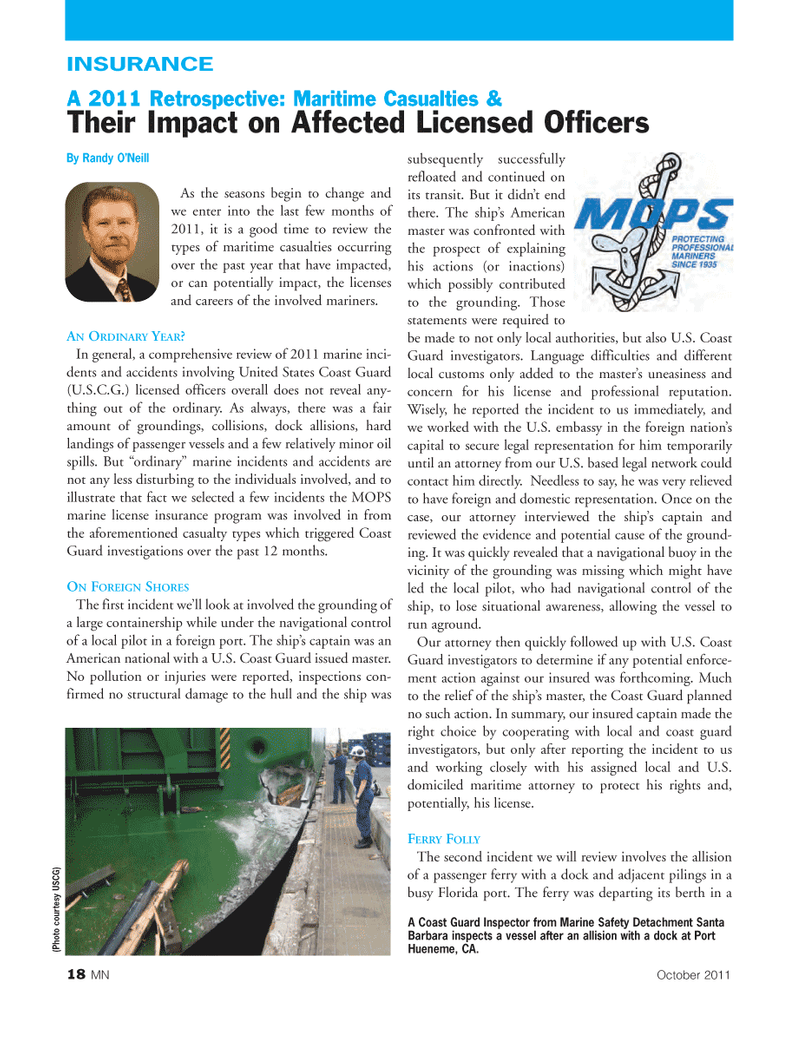
Page 18: of Marine News Magazine (October 2011)
The Yearbook
Read this page in Pdf, Flash or Html5 edition of October 2011 Marine News Magazine
18MNOctober 2011INSURANCEAs the seasons begin to change andwe enter into the last few months of 2011, it is a good time to review the types of maritime casualties occurringover the past year that have impacted, or can potentially impact, the licensesand careers of the involved mariners. ANORDINARY YEAR?In general, a comprehensive review of 2011 marine inci- dents and accidents involving United States Coast Guard (U.S.C.G.) licensed officers overall does not reveal any- thing out of the ordinary. As always, there was a fair amount of groundings, collisions, dock allisions, hard landings of passenger vessels and a few relatively minor oil spills. But ?ordinary? marine incidents and accidents are not any less disturbing to the individuals involved, and to illustrate that fact we selected a few incidents the MOPS marine license insurance program was involved in from the aforementioned casualty types which triggered Coast Guard investigations over the past 12 months. ONFOREIGNSHORESThe first incident we?ll look at involved the grounding of a large containership while under the navigational control of a local pilot in a foreign port. The ship?s captain was an American national with a U.S. Coast Guard issued master. No pollution or injuries were reported, inspections con- firmed no structural damage to the hull and the ship was subsequently successfullyrefloated and continued on its transit. But it didn?t end there. The ship?s American master was confronted with the prospect of explaining his actions (or inactions)which possibly contributedto the grounding. Those statements were required to be made to not only local authorities, but also U.S. CoastGuard investigators. Language difficulties and different local customs only added to the master?s uneasiness and concern for his license and professional reputation. Wisely, he reported the incident to us immediately, and we worked with the U.S. embassy in the foreign nation?s capital to secure legal representation for him temporarily until an attorney from our U.S. based legal network could contact him directly. Needless to say, he was very relieved to have foreign and domestic representation. Once on the case, our attorney interviewed the ship?s captain and reviewed the evidence and potential cause of the ground- ing. It was quickly revealed that a navigational buoy in the vicinity of the grounding was missing which might have led the local pilot, who had navigational control of the ship, to lose situational awareness, allowing the vessel to run aground. Our attorney then quickly followed up with U.S. Coast Guard investigators to determine if any potential enforce- ment action against our insured was forthcoming. Much to the relief of the ship?s master, the Coast Guard planned no such action. In summary, our insured captain made the right choice by cooperating with local and coast guard investigators, but only after reporting the incident to us and working closely with his assigned local and U.S. domiciled maritime attorney to protect his rights and, potentially, his license. FERRY FOLLY The second incident we will review involves the allision of a passenger ferry with a dock and adjacent pilings in a busy Florida port. The ferry was departing its berth in a By Randy O?NeillA 2011 Retrospective: Maritime Casualties & Their Impact on Affected Licensed Officers A Coast Guard Inspector from Marine Safety Detachment Santa Barbara inspects a vessel after an allision with a dock at Port Hueneme, CA.(Photo courtesy USCG) MN#10 (18-31):MN 2011 Layouts 10/5/2011 1:46 PM Page 18

 17
17

 19
19
